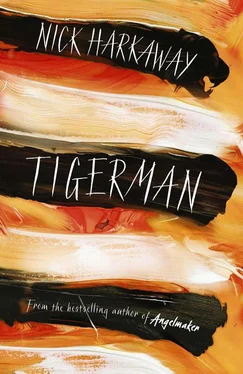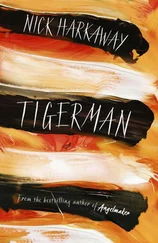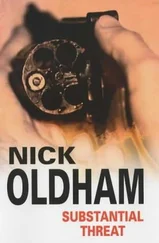The men had been separated and held incommunicado. They had been given water to drink and basic medical attention and food. Yesterday, the Sergeant judged, would have been the perfect time to talk to them, but today would do. And the boy would be an added oddness, an unbalancing factor. They might believe Shola had been his father.
Which raised the question of whether he had been, but the Sergeant pushed this to one side.
‘I’ll get you in,’ he told the boy, ‘but you don’t talk and you do what I say, all right?’
The boy nodded. His lips formed words but there was no breath in them. After a moment, the Sergeant turned to him firmly, made him spread his arms in a T-shape, and frisked him. No knife. No razorblade. No bomb, no gun. No vial of some appalling gas or germ sneaked from a Fleet repository in exchange for a particularly impressive bit of local contraband.
‘Sorry,’ the Sergeant said.
‘No,’ the boy replied. ‘You are so right. I would waste these badmashes in two ticks of a lamb’s arsehole. For Shola, I totally would.’
The Sergeant nodded. ‘I know you would,’ he said.
‘Whatever,’ the boy growled. ‘Emote later. Right now: Voight-Kampff FTW.’
With this perplexing battle-cry, he turned and went inside.
A Canadian marine wearing NatProMan tour ribbons shepherded them with casual courtesy. The Sergeant wondered how it must have felt to a crew of Mancreu hardcases to be herded down these antiseptic steps. The whole place smelled tartly of phenols. In his childhood that same odour had meant cough pastilles, sugar-coated and blackcurrant-flavoured. One winter he’d had flu: the real thing, hot and bloody awful, and no one had realised until he collapsed on the doormat at home. He had walked back from school, eaten half a dozen of those pastilles one after another, his mouth turning itself inside out, demanding more and more to cut the nausea and the confusion. The whole city had been coming and going in his eyes, grey with rain and red with brakelights, then dark. He’d had a cassette-player Walkman clipped to his belt: the size of a brick, with flimsy headphones. Music copied from an LP, his mother’s, his father’s, a friend’s. It didn’t matter so long as it drowned out the world while he walked, coat soaked through, fever poaching him in his clothes.
The boy shivered. The Sergeant reached out and checked his forehead. It was quite cool.
‘Sir?’ the marine said.
‘I’m a sergeant,’ he responded automatically. ‘I work for a living.’
‘Yes, Sergeant,’ the marine said, and whatever query he had been mustering went away. The Sergeant waited. The marine waited, too, politely but not without a measure of confusion.
After they had all stood in front of the door for a while, the Sergeant realised there was nothing to wait for. Always before in his professional life, whenever he had visited prisoners, there had been a form of words. The custodian of any detention facility had given some sort of warning about proper and improper questions, and the limitations of lawful conduct. But not on Mancreu. Not here. You did what you wanted as long as you were in charge. That was the whole point. He could kill these men: Jed Kershaw might be cross with him, but probably wouldn’t be. No one would seriously object, and if they did, there was no law to prosecute him. Everyone on the island walked within bounds out of sheer habit, respected property and persons and decency because they knew those things were important. But there was no constraint any more, just what you did. He wondered if the men, knowing that, had drawn fearful conclusions from the abattoir tiles and the drains in the floor.
The boy nodded to him, and they went into the first cell.
The man inside was a hillman with a wide face. He positively strutted in his cuffs.
The Sergeant asked his first question. The man nodded like a celebrity, smiled. He had been paid by the Americans to murder the barman, and the whores. Yes. Paid millions of dollars in a Swiss bank account. Hundreds of millions. He would be out of here soon.
The Sergeant asked who would get him out.
The President, the man said. Of the United States. He would personally order it, but of course the order would be disguised. All the same, that was just how it would be.
And what, the Sergeant asked, would happen then?
The man would buy a helicopter and a skyscraper and he would live in Switzerland. He would have a big house by the sea, he had seen pictures of it. If the Sergeant wanted a job, he could apply. The Sergeant looked like the right sort of man. Dependable, not ambitious.
The boy stepped in, briefly, to observe that Switzerland was not known for its sea coast.
The man jerked back and for a moment he seemed appalled. His mouth stretched wide as if he was going to vomit. Then he shuddered and rolled his head on his neck (things went pop inside him, bones and gristle). He sighed and shook his finger. Children were a trial, he said. They knew nothing of the world. If the Sergeant would take the boy out, it might be better, and they could speak as men, discuss the details of his future employment.
They moved on to the second cell. The occupant was mousy, so the Sergeant asked his questions quietly. That was in the lessons he had had. It was a crude form of something called kinesic interview. You took your cues from the subject. If you were lucky, it helped. Usually — according to the learned DI Burroughs — you were not lucky.
The man said he was a herder. He had driven the car because he was paid to, and then he was told he was coming in. He had come in because he was made to. Yes, he had carried a gun. Everyone had a gun. He had fired high and wide because otherwise he would not be paid and he was afraid he might also be shot. He still was not sure that would not have happened, after. He was sorry for what had been done by the others. Very sorry. For all his life he would be sorry for the barman and the pretty girls.
It was plausible. It could also be so much shit. No way to know, not really. The Sergeant’s gut told him it was probably shit.
The next cell was a slightly different shape, a little closer and tighter — which also made it darker — and the prisoner lay on his bed and did not get up. He was not seriously injured. His face expressed a kind of distant uncaring. He looked at them briefly, flinched a little when he saw the boy, then seemed to accept his inevitability and turned away, in dismissal or despair the Sergeant could not say.
‘Don’t know anything,’ the man muttered as he stared at the wall, from which position no inducement short of physical force could move him.
In the fourth cell, on the off chance, the Sergeant changed tack and did a certain amount of shouting. The man in the fourth cell had a missing toe and looked to be in pain — not horrible pain but misery pain — so shouting was particularly unpleasant for him. He wept. The boy shouted too, got right down beside him and shouted high and long into his face. The man protested and objected and demanded more of whatever they were giving him for the toe. That and strong drink.
‘Why?’ the Sergeant repeated. ‘You came into my friend’s bar and gunned him down. Why?’ And then he was shouting quite genuinely, screaming into the prisoner’s face over and over: ‘WHY? WHY? WHY?’
He pulled himself back sharply, swallowed. He wished for a chain of command, for men in authority above him to hold him back. He wished for laws to make his limits plain. He wanted very much to beat the murder out of all of them, to bruise them and bludgeon them and let out the fury in his chest. Line them up like fucking tomatoes and cut them down, over and over and over, these bastards who had done this bloody, brutal thing on his doorstep, who had come into his special place, his town, his island and killed his friend, made the boy so bleakly and irretrievably unhappy. Made the boy grow up.
Читать дальше
Конец ознакомительного отрывка
Купить книгу











